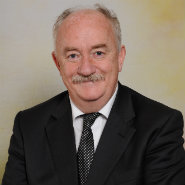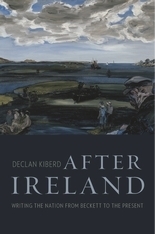
In the introduction to his newly published After Ireland: Writing the Nation from Beckett to the Present (Harvard University Press, 2018), Faculty Fellow Declan Kiberd (Donald and Marilyn Keough Professor of Irish Studies and Professor of English and Irish Language and Literature) writes about the moment in September 2008 when the Irish economy came crashing down and the phenomenon known as the “Celtic Tiger” was emphatically dead:
"Most people were astounded by the immensity of the crash when it came. Apart from a few isolated economists, nobody had predicted it or seen any sign of its coming. . . They insisted, in their innocence, that nobody had alerted them to the underlying abuses. Nobody had warned them that their very country was in danger of disappearance."
But this was not true, he says. Rather:
"In every decade after independence, writers and artists had given warnings about these things. Writers in particular had suggested, even during the birth-pangs of the Free State, that the country might have been stillborn."

In After Ireland, Kiberd explores works of nearly 30 modern poets and writers—John Banville, Samuel Beckett, Brian Friel, Seamus Heaney, Claire Keegan, Nuala Ní Dhomhnaill, Edna O’Brien, and Frank O’Connor, among them—and traces the development of this “early warning system” through specific poems, plays, short stories, or novels. He demonstrates how some of the writers lament the loss of the Irish language, Gaelic tradition, and rural life. Others grapple with cultural changes in the wake of the women’s movement, increasing secularization, or ever-increasing emigration. For others, the Troubles are the political and cultural reference.
After Ireland completes the trilogy that Kiberd began with Inventing Ireland: The Literature of the Modern Nation (Harvard University Press, 1997) and then Irish Classics (Harvard University Press, 2001).
Despite the nearly seismic political, economic, and cultural shifts Ireland has experienced in recent years, Kiberd, who coined the phrase “the worlding of Irish studies,” concludes the book by expressing much hope in the globalized literature of the new Ireland—literature that makes these contemporary writers “now part of a worldwide conversation about their country’s cultural meaning.”
“Ireland has been, through its history, a laboratory for almost everything—ethnic separation; religious apartheid; colonial misrule; cultural revival; nationalist insurrectionism; unleashed market forces; and, most recently, austerity and penance,” he says in a recent Irish Times essay. “Let’s hope that only the ‘cultural revival’ bit is reprised. . . An island possessed of so many fine writers, animators, musicians, storytellers, playwrights, film-makers can surely become a major hub of the creative class in the contemporary world.”
Read more:
After Ireland: Writing the Nation from Beckett to the Present, Declan Kiberd (Harvard University Press, January 2018) Publication information and reviews.
"How Ireland creates writers, and writers created Ireland," Declan Kiberd on CBC Radio, The Sunday Edition, June 2018
“Great Minds Think Aloud,” Eithne Shortall, London Sunday Times, January 14, 2018.
“Waiting for Ireland: How Irish writers from Samuel Beckett onward captured the hopes and weaknesses of a nation,” Smithsonian VIP, December 2017.
“Irish writers were an early warning system about abuse,” Declan Kiberd, Irish Times, October 21, 2017.